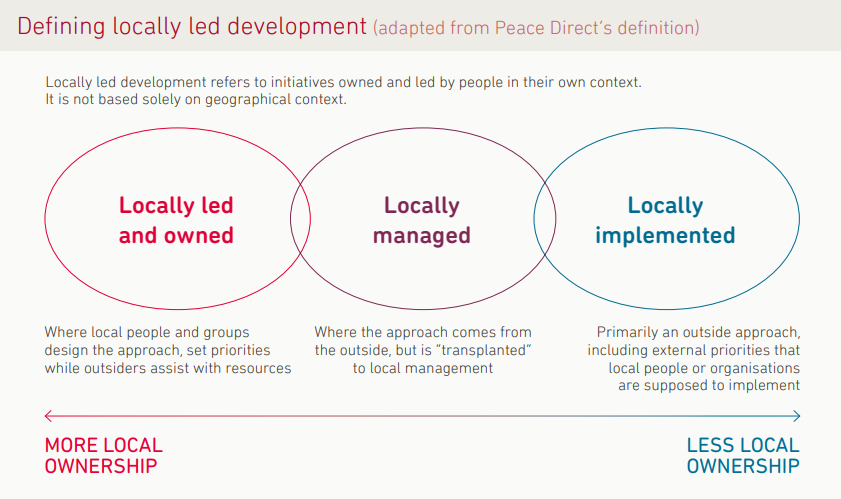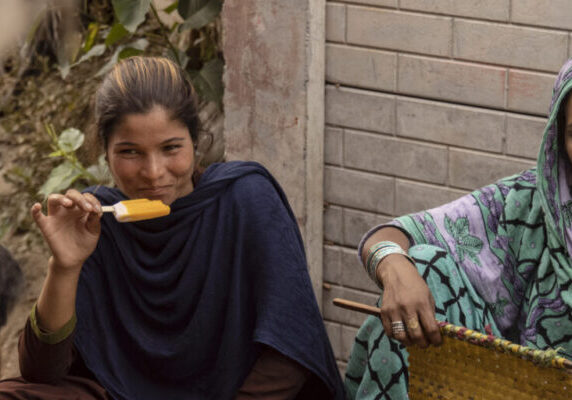Locally led development
Bond is committed to supporting the UK international development sector to adopt anti-racist behaviours and mindsets that ensure power and resources drive more equitable, locally led development.
The UK international development sector needs to urgently redress power imbalances to become a more effective, equitable and community focused system. The need to adopt new behaviours and mindsets that ensure power and resources drive more equitable, community-led development has become a priority for many in UK-based international non-governmental organisations (INGOs). We are at a pivotal moment.
The need for change is driven by a variety of factors – not least the need to decolonise and decentralise the aid system. The growing demands to reform the aid sector’s structure, culture and practices is being driven by INGOs themselves, alongside CSOs and communities where development projects take place, feminist groups, human rights groups and community foundations. Challenging power dynamics lies at the heart of this issue, as we collectively recognise the colonial history on which the development sector has been designed and the power dynamics, structures, narratives – and indeed structural racism – that uphold the status quo.
How do we define locally led development?
At Bond, we have adapted Peace Direct’s definition and understand it as an approach to development to ensure that initiatives are owned and led by people in their own context. Local actors operate on a range of levels – community, subnational and national. The definition of local actors encompass a wide range of groups, including national civil society organisations or groups and local governments. We also recognise that the concept of locally led development cannot be reduced to nationality or geographical location and that the terms we are using now are not sufficient – possibly imperfect – and will require more reflections and discussions.

What do we mean by community-led development?
An approach to development that puts the people most affected by development or humanitarian work in the lead. This approach ensures diverse representation in planning and decision-making, mobilises the community’s own resources and uses feedback to improve the programme.
What has Bond been doing?
There are a growing number of examples of community-led change in a variety of countries. But the shift needed to ensure locally led actors have the power and resources to own their development is significant and the pace of change is slow. We are finding ways for the UK international development sector to accelerate. Over the last year we have convened our members to understand the key barriers to change and identified areas for collective action.
Our initial diagnosis in the report Catalysing locally led development in the UK aid system identified three barriers to UK NGOs making faster progress:
- inappropriate funding regimes, with a particular focus on the policies and practices of FCDO
- governance structures and organisational cultures that don’t support change (trustee accountability, success measures, whose voice is heard etc)
- lack of trust in emergent/ alternative approaches, based on colonial mindsets
We are now working with members to find solutions to these barriers.
Supporting organisations to change
We are supporting organisations to change through the working groups as well as through different resources and sessions.
We launched Becoming locally led as an anti-racist practice: a guide. The guide, which will evolve as it is used, has been developed in response to growing demand from the international development sector to change how organisations work, make decisions, and are structured and governed, with the aim of becoming more locally led.
Changing donor policy and practice
We are convening members and funders to influence change in their policies and practices.
We developed a collection of stories of what makes a good locally led funder that provides concrete ideas to help design funding models that are accessible and appropriate for community-led development. They are designed for institutional donors, NGOs, development agencies, foundations, philanthropies – any person or institution who intends to resource development work within the UK and internationally.
Advisory group
The initial purpose of the Advisory Group is to inform and shape Bond’s work supporting the sector to become more locally led. The group will help this work to be based on lived experience, help us maintain our values for shifting power, make suggestions on the direction of the programme of work and advise on key decisions and hold us to account.
Hafsah Muheed, Founder of Amplifying Impact
Chilande Kuloba-Warria, Founder and Director of Warande Advisory Centre
Ayse Sargin, Critical development practitioner, researcher and activist
Wanjiru Kanyiha, Executive Director of the Kilimani Project Foundation
Sudhanshu Singh, Founder and CEO of Humanitarian Aid International (HAI)
Nojus Saad, Board President and CEO of Youth For Women Foundation
Moses Isooba, Executive Director of the Uganda National NGO Forum (UNNGOF)
If you want to find out more and get involved in this work, you can join the Supporting practice, Changing donor and Sector commitments working groups.




